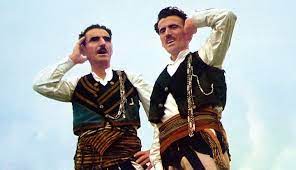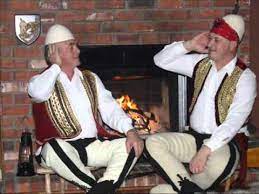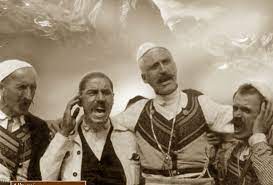‘War cries’ songs, or as otherwise dubbed, majekrahu songs, are fairly known to have no instrumental accompaniment. They represent one of the oldest strands of intangible heritage which highlanders have manifested in weddings, festivities, gaiety, mountains, etc.
These songs have also been practiced in cases of call-and-response songs, between different areas since war times, aiming to communicate and convey news with one another while going unnoticed by the enemy.
A distinctive feature of these songs is the singer’s brilliant voice that starts the call and is promptly accompanied by the other singer unifying the voices into a single one.
The content of these songs is a short summary in three or four lines each of eight syllables about a story or bravery mentioned. These words are selected from the rhapsodies composed by the populace of these areas.
Exemplifying of lyrics of war cry songs:
“AI PAL GJOKA SHKOJ TE DAJA,
VALLË KU RRIN SULEJMAN AGA,
N’KODËR T’KIRIT NËN DO ÇADRA…”
(“PAL GJOKA HEADED TO HIS UNCLE,
WONDERING WHERE SULEJMAN AGA IS,
ON KIRI HILL SOMEWHERE AROUND WAR TENTS… ”)
(shows Dukagjini’s resistance in the war against the Ottomans)
“LIDHI SHALA BESËN
N’AT SARAJ PO VDESIM
TROJET KURRË SI SHESIM…”
(“SHALA FOLKSMEN PLEDGE THEIR FAITH”
FOR THIS LAND FIGHTING TO DEATH
NEVER SURRENDER NOR TURN TRAITOR…”)
“Ç’JANË KTO GJAMË SI PO I BJEN ERA,
LUFTË PO BAJNË RUGOVA E PEJA,
SE LAMË TJETER SHKJAUN TE DERA… ”
(“WIND IS BLOWING CLARION CALLS AWAY
FIGHTING BROKE OUT IN RUGOVA AND PEJA
NO SHKJA ON OUR DOORSTEP…”)
The war cry song has always opened and closed the wedding banquet. Once the bride appeared, a war cry song was sung. When the wedding started, words of blessing and greeting were exchanged with the knocking of raki glasses and a local has afterward sung the majekrahu song, with the bridal veil (duvak) having been lifted. The war cry song has always come first, followed by lahuta (a lute-like instrument). No raki toast was made either without first singing the majekrahu song, to next proceed with the hosted dinner.
This traditional song has been passed down through generations to the present day.



